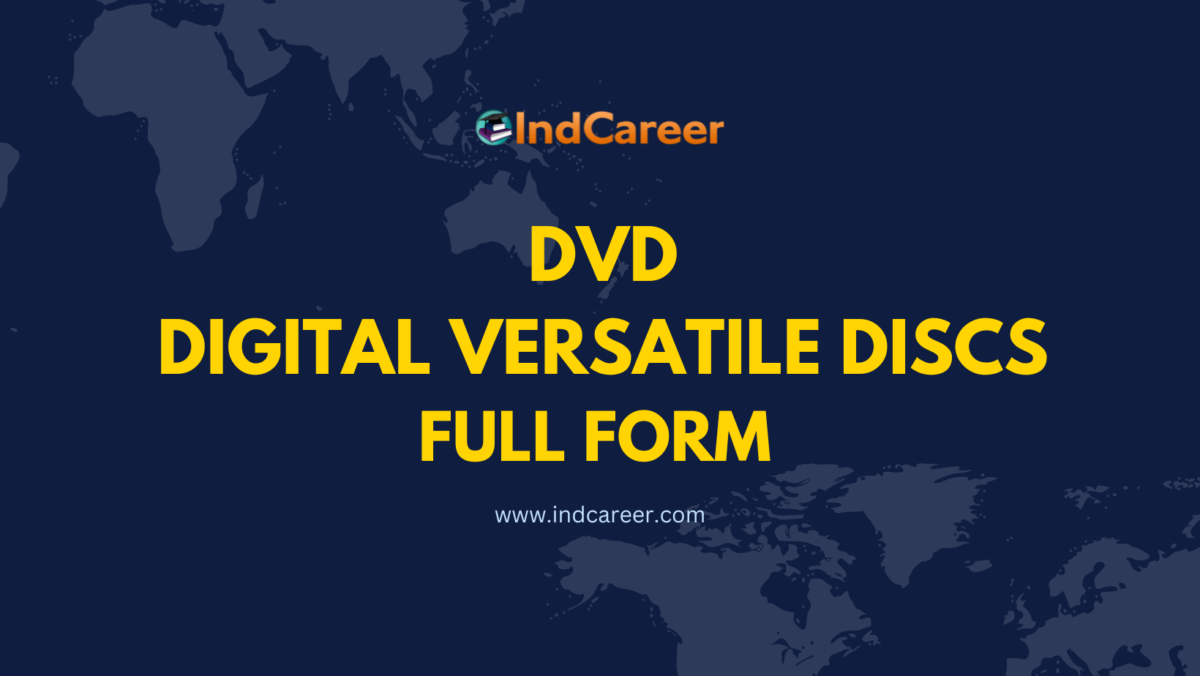Contents
- 1 DVD Full Form – What is full form of DVD?
- 2 Explanation of the Full Form of DVD
- 3 History and Evolution of DVD Technology
- 4 DVD Formats and Capacities
- 5 DVD Production Process and Data Storage
- 6 Advantages of Using DVD Technology
- 7 Various Applications of DVDs
- 8 DVD Players and Compatibility
- 9 DVD Burners and Their Importance
- 10 DVD Reliability and Lifespan
- 11 DVD vs. Other Storage Media
- 12 Future Prospects of DVD Technology
- 13 Conclusion
- 14 FAQs
DVDs, or Digital Versatile Discs, have become an integral part of our digital lives. These discs are widely used for storing and distributing various forms of digital data, such as movies, music, software, and more. In this article, we will explore the full form of DVD, delve into its history, discuss its significance, and explore the various aspects related to DVD technology.
DVD Full Form – What is full form of DVD?
Explanation of the Full Form of DVD
DVD stands for “Digital Versatile Disc.” The term “versatile” in the acronym signifies the multifunctional nature of the disc. Originally, DVD stood for “Digital Video Disc,” as it was primarily developed for video storage and playback. However, with technological advancements, the format expanded its scope beyond video content, offering a wide range of applications.
History and Evolution of DVD Technology
DVD technology emerged in the late 1990s as a successor to CDs (Compact Discs). The format was developed by a consortium of technology companies, including Sony, Philips, Toshiba, and Panasonic. It aimed to provide a high-capacity storage solution, capable of holding larger video files.
DVD Formats and Capacities
There are several DVD formats, each designed for specific purposes. The most common formats include DVD-ROM (Read-Only Memory), DVD-R (Recordable), DVD-RW (ReWritable), DVD+R (Recordable), and DVD+RW (ReWritable). These formats differ in terms of compatibility, writing speed, and storage capacities, ranging from 4.7GB to 17GB.
DVD Production Process and Data Storage
The production process of DVDs involves encoding digital data onto a metalized reflective layer, which is sandwiched between two polycarbonate layers. The data is then read by laser beams in DVD players, enabling high-quality playback. DVDs utilize a spiral groove pattern to store data, with each groove containing multiple microscopic pits and lands that represent encoded information.
Advantages of Using DVD Technology
DVDs offer several advantages over other storage media. They provide larger storage capacities, better video and audio quality, and compatibility with various multimedia devices. DVDs are also portable and durable, allowing users to easily carry them and access their content on different platforms.
Various Applications of DVDs
DVDs have a wide range of applications. They are commonly used for distributing movies, TV shows, music albums, and software programs. Educational institutions use DVDs as teaching aids, and businesses utilize them for presentations and archival purposes. Additionally, DVDs can store personal data, such as photos, videos, and documents.
DVD Players and Compatibility
DVD players are electronic devices specifically designed to read and play DVDs. These players are compatible with different formats, enabling users to enjoy a wide variety of digital content. Additionally, some DVD players incorporate advanced features like upscaling, which enhances the image quality of DVDs when played on high-definition TVs.
DVD Burners and Their Importance
DVD burners, also known as DVD writers, allow users to write or burn data onto DVD discs. These devices are essential for creating backups, storing personal data, and authoring DVDs. DVD burners come in various formats, such as internal drives for computers and external drives for laptops and other portable devices.
DVD Reliability and Lifespan
DVDs are known for their reliability and long lifespan, provided they are handled and stored properly. The average lifespan of a DVD is estimated to be around 30 years, making it a reliable archival medium. However, factors like exposure to extreme temperatures, sunlight, and scratches can significantly affect a DVD’s performance and longevity.
DVD vs. Other Storage Media
DVDs compete with other storage media like Blu-ray discs, USB drives, and cloud storage. Each medium has its advantages and disadvantages. DVDs offer cost-effective storage solutions, while Blu-ray discs provide higher capacities for high-definition content. USB drives offer portability and convenience, while cloud storage allows remote access to data.
Future Prospects of DVD Technology
Despite the rise of alternative storage technologies, DVDs continue to play a significant role in the domain of physical media. The format may witness a decline in popularity due to the surge in online streaming and digital downloads. However, DVDs still cater to a vast user base and are expected to sustain their relevance in specific areas like physical media collectors, educational institutions, and regions with limited internet access.
Conclusion
In conclusion, DVDs have revolutionized the way we store, distribute, and consume various forms of digital content. The acronym DVD, which stands for Digital Versatile Disc, aptly defines its versatility and multifunctional nature. With their high storage capacities, reliability, and compatibility, DVDs continue to be an important medium for Indian college-going students and users worldwide.
FAQs
Yes, DVDs can store high-definition movies, but the quality is limited to standard definition (SD). For high-definition content, Blu-ray discs are recommended.
Most modern DVD players support DVD-R discs. However, it’s recommended to check the compatibility of your DVD player before burning DVDs.
The burning speed of a DVD depends on various factors, such as the DVD burner’s speed capabilities and the size of the data being burned. On average, it may take around 10-15 minutes to burn a standard DVD.
es, DVD-RW discs are re-writable and can be erased and re-used multiple times. They offer flexibility for data storage and backups.
Finalization is recommended if you want to ensure the DVD is playable on different devices. Finalizing the DVD completes the burning process and prepares it for universal compatibility.
